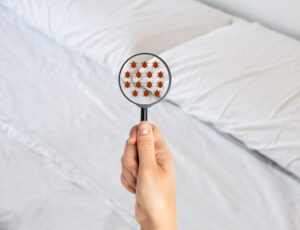Why Do You Have Blurry Vision in the Morning?
Eyesight is an important sense for navigating daily life, so it can be alarming to wake up with blurry vision, especially if the cause is unclear. Blurry vision in the morning can be a sign that it is time for new glasses or contact lenses, or it may be a symptom of an underlying medical condition.
Regardless of its cause, blurry vision often signals the need to check in with a doctor or eye specialist. We discuss some of the potential causes of blurry vision, including tips for managing some of the most common causes and the importance of working with a health professional to diagnose the cause of vision changes.
Are You Getting Enough Deep Sleep?
A variety of issues can cause degrade your sleep quality. Answer three questions to understand if it’s a concern you should worry about.
Why Your Vision Is Blurry When You Wake Up
Blurry vision is a common experience that can have a wide range of causes. These include untreated refractive errors, dry eyes, and other conditions that affect eyesight.
Refractive Errors
Whether blurry vision happens in the morning or lasts throughout the day, reduced clarity is the most common symptom of an untreated refractive error. A refractive error is the medical term for changes to the shape of the eye that affect a person’s vision.
- Myopia: Also called nearsightedness, myopia causes objects to be blurry when viewed from too far away.
- Hyperopia: Also known as farsightedness, hyperopia makes objects appear blurry when viewed up close.
- Astigmatism: This refractive error is due to a misshapen eye surface that makes objects look blurry from any distance.
A related condition called presbyopia is triggered by changes in the eye that develop as people get older. This type of vision change usually begins after age 40 and involves difficulty seeing images close up.
Refractive errors and presbyopia may be treated with glasses, contact lenses, or corrective eye surgery. Because vision can change over time, blurry vision may be a sign that it is time for a new prescription or a checkup with an eye doctor.
Dry Eyes
Blurry vision is also a common symptom of dry eyes. Usually, the eyes are coated in a layer of tears that improves the clarity of vision and provides protection from germs and irritants. Dry eyes develop if the eye fails to make sufficient tears, if tears dry out before properly lubricating the eyes, or if tears are not able to keep the eyes moist.
In addition to blurry vision, other symptoms of dry eyes include redness, burning, sensitivity to light, and the sensation of having something in the eyes. Dry eye symptoms may be more noticeable upon waking , because tear production tends to drop temporarily during this time.
Many factors can contribute to dry eyes, including:
- Sleep loss
- Medications used to treat allergies, high blood pressure, or depression
- Health conditions including diabetes, thyroid diseases, or Sjogren syndrome
- Laser eye surgery
- Environments that are windy, dry or contain smoke
- Excessive time looking at TV, phone, or computer screens

Sleeping With Your Eyes Open
The ability to fully close the eyelids while sleeping is important for keeping the eyes protected and moist, so if a person sleeps with their eyes partially open, they may wake up with symptoms similar to dry eyes.
Also called nocturnal lagophthalmos, sleeping with the eyes open can be caused by a variety of conditions, including bulging of the eyes and paralysis of nerves in the face after an infection, injury, or due to a condition present at birth. Sleeping without fully closing the eyes may also make it harder to sleep and contribute to the symptoms of insomnia.
Allergies
Allergies to pet dander, dust mites, or pollen can cause blurry vision when the eyes swell and tear up as they react to an allergen. The eyes of people with allergies may also be red, itchy, and sensitive to light in the morning. These symptoms are often accompanied by other allergy symptoms, such as crusting around the eyelids and a runny nose.
Sleeping With Your Contacts In
Blurry vision can also result from falling asleep without removing contact lenses. Contact lenses can accumulate debris over time and cause irritation to the eye associated with blurry vision. Sleeping with contacts in also raises the risk of eye infections , which can cause blurred vision, pain, sensitivity to light, and a red or swollen eye.
Pressure on the Eyes
Research suggests that putting physical pressure on the eyes , such as by sleeping with the face pressed against the pillow, may indirectly worsen eye symptoms. Anecdotally, some people also report waking up with blurry vision after wearing a sleep mask that is too tight.
Although eye masks can be useful for blocking out light, they should not feel uncomfortable. If a mask is too tight, loosen the straps or purchase a better-fitting mask. Some models have a foam outline to prevent the mask from putting pressure directly on the eyes.
Eye Conditions
Blurry vision can develop after scratching or otherwise physically injuring the eye, but it is also a symptom of many other eye conditions.
- Infection: A variety of infections of the eye or tissues surrounding the eye are associated with blurry vision. For example, conjunctivitis, commonly called pink eye, causes itchiness, pain, swelling, red eyes, crustiness in the morning, as well as blurred vision.
- Glaucoma: Glaucoma causes damage to the optic nerve, which may result in blurry vision.
- Cataracts: Cataracts occur when the lens of the eye becomes cloudy. In addition to having blurry vision, people with cataracts may have trouble seeing at night, see colors as faded, or see a halo-type shape around light sources.
- Fuchs’ dystrophy: A corneal condition called Fuchs’ dystrophy often causes blurry vision in the morning, which gradually improves throughout the day. People with Fuchs’ dystrophy may also see a halo around lights.
- Macular degeneration: Macular degeneration causes blurry vision that affects the ability to see clearly, especially in the center of the visual field.
- Keratoconus: Keratoconus can cause blurry or double vision, itchy eyes, trouble seeing, and sensitivity to light. Sleeping on the side or face down may increase the risk of developing keratoconus for people who are already susceptible to the disease.
Underlying Medical Conditions
A number of other medical conditions can also cause blurry vision.
- Diabetes: Diabetes increases the risk of several conditions that result in blurry vision, including cataracts, glaucoma, and retinopathy. Blurry vision can be one of the first signs of high blood sugar, and blurry vision can also occur when blood sugar levels drop, get too high, or change too quickly.
- Preeclampsia: Preeclampsia is a sudden rise in blood pressure during pregnancy, which can cause changes in vision and seizures if not treated promptly. Other symptoms of preeclampsia include a persistent headache, trouble breathing, nausea, vomiting, pain in the upper abdomen, or a swollen face and hands.
- Obstructive sleep apnea: People with obstructive sleep apnea have multiple episodes of shallow or stopped breathing while they sleep. Evidence suggests that obstructive sleep apnea affects the functioning of tears and is associated with other conditions that cause blurry vision, including dry eye syndrome and floppy eyelid syndrome .
- Migraine: Migraine headaches may be accompanied by vision changes, including blurry vision, brief loss of vision, or tunnel vision.
- Stroke: Someone having a stroke may experience blurry vision along with other symptoms such as dizziness, nausea, and trouble controlling one side of the body.
- Parkinson’s disease: Blurred vision is one symptom of Parkinson’s disease, a neurological disorder that also causes tremors and periods of being unable to move parts of the body.
- Multiple sclerosis: Multiple sclerosis is an autoimmune condition that affects the nervous system, causing pain and problems with feeling, balance, and vision.
What Is Eye Crust?
Many people wake in the morning with crust in the corner of their eye, although this is not known as a common cause of blurry vision.
During the night, dead cells, bacteria, dust, and other particles collect on the surface of the closed eye. This buildup is sometimes referred to as rheum, sleep, or eye crust. Particles in the eye mix with tears and leave the eye naturally, a process that helps keep the eye clean. Blinking several times after waking up helps to clear rheum from the eye.
How to Fix Blurry Vision After Waking Up
The best way to correct blurry vision after waking up depends on the cause. For this reason, it is important to talk to a doctor or eye specialist about blurry vision and other changes in eyesight. In general, people should refrain from rubbing their eyes , as this can damage the corneas.
When blurriness is caused by dry eyes, a doctor can help provide guidance on managing symptoms with medical treatments or lifestyle changes. Tips for reducing dry eyes at home include:
- Get the right amount of sleep each night
- Avoid sleeping near air conditioning
- Use a humidifier if the bedroom air is dry
- Reduce time spent looking as screens
- Wear sunglasses when outdoors
- Stay hydrated

Still have questions? Ask our community!
Join our Sleep Care Community — a trusted hub of sleep health professionals, product specialists, and people just like you. Whether you need expert sleep advice for your insomnia or you’re searching for the perfect mattress, we’ve got you covered. Get personalized guidance from the experts who know sleep best.
References
9 Sources
-
National Eye Institute. (2019, July 8). Eyeglasses for refractive errors., Retrieved January 25, 2023, from
https://www.nei.nih.gov/learn-about-eye-health/eye-conditions-and-diseases/refractive-errors/eyeglasses-refractive-errors -
Lee, Y. B., Koh, J. W., Hyon, J. Y., Wee, W. R., Kim, J. J., & Shin, Y. J. (2014). Sleep deprivation reduces tear secretion and impairs the tear film. Investigative Ophthalmology & Visual Science, 55(6), 3525–3531.
https://pubmed.ncbi.nlm.nih.gov/24833736/ -
Soong, H. K., Hood, C. T., & DeLoss, K. S. (2023, February 8). Complications of contact lenses. In D. S. Jacobs (Ed.). UpToDate., Retrieved February 10, 2023, from
https://www.uptodate.com/contents/complications-of-contact-lenses -
Alevi, D., Perry, H. D., Wedel, A., Rosenberg, E., Alevi, L., & Donnenfeld, E. D. (2017). Effect of sleep position on the ocular surface. Cornea, 36(5), 567–571.
https://pubmed.ncbi.nlm.nih.gov/28257381/ -
Song, M., Fang, Q. Y., Seth, I., Baird, P. N., Daniell, M. D., & Sahebjada, S. (2022). Non-genetic risk factors for keratoconus. Clinical & Experimental Optometry, 1–11.
https://pubmed.ncbi.nlm.nih.gov/35504720/ -
Liu, S., Li, S., Li, M., Zeng, S., Chen, B., & Zhang, L. (2022). Evaluation of the ocular surface and meibomian gland in obstructive sleep apnea hypopnea syndrome. Frontiers in Medicine, 9, 832954.
https://pubmed.ncbi.nlm.nih.gov/35223929/ -
Santos, M., & Hofmann, R. J. (2017). Ocular manifestations of obstructive sleep apnea. Journal of Clinical Sleep Medicine, 13(11), 1345–1348.
https://pubmed.ncbi.nlm.nih.gov/28942764/ -
Mahajan, A., Grüneboom, A., Petru, L., Podolska, M. J., Kling, L., Maueröder, C., Dahms, F., Christiansen, S., Günter, L., Krenn, V., Jünemann, A., Bock, F., Schauer, C., Schett, G., Hohberger, B., Herrmann, M., & Muñoz, L. E. (2019). Frontline science: Aggregated neutrophil extracellular traps prevent inflammation on the neutrophil-rich ocular surface. Journal of Leukocyte Biology, 105(6), 1087–1098.
https://pubmed.ncbi.nlm.nih.gov/30977943/ -
National Eye Institute. (2019, August 3). Corneal conditions., Retrieved January 25, 2023, from
https://www.nei.nih.gov/learn-about-eye-health/eye-conditions-and-diseases/corneal-conditions










